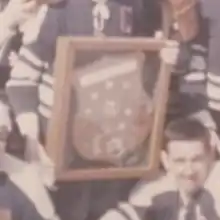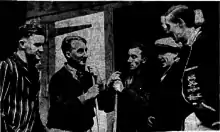Jim Brown Shield
The Jim Brown Shield is currently an annually awarded interstate ice hockey championship trophy in Australia for senior men aged 17 years and older with the condition that players of the Australian Ice Hockey League that are 24 years and older must have played less than 6 games to remain eligible. The current trophy is in the form of a shield and is the third trophy to bear the Brown family name. The trophy is named after Scottish born James Archibald Brown. The Jim Brown Shield is competed for in a series of games between state representative teams in what is called the Australian Men's National Ice Hockey Championship.[1]
| Sport | Ice hockey |
|---|---|
| Competition | Australian Men's National Ice Hockey Championship |
| Awarded for | Interstate tournament champions for men aged 17 years and older *(AIHL players 24 years and older must have played less than 6 AIHL games) |
| History | |
| First award | 1963 |
| Most recent | Western Australia |
History
Currently, the trophy is referred to as the Jim Brown Shield and as of the 2015 season it is competed for by men aged 17 years and older with the exception that AIHL players aged 24 years and older must have played less than 6 AIHL games.
The Jim Brown Shield has been the award for what is currently known as the Australian Men's National Ice Hockey Championship since its inaugural year in 1963. This tournament was looked at like a reincarnation of the Return Inter-State Series, which ceased to exist around the time of the closing of the Sydney Glaciarium. The Return Inter-state Series would use the F.C. Brown Memorial Shield as its award but this shield was later lost and for the new tournament in 1963, the Jim Brown Shield was donated to the tournament by Harry Curtis and has remained as the perpetual award for the tournament since. The tournament itself remained as a showcase for the players who did not get selected to represent their state to compete for the Goodall Cup in the Inter-state series and was viewed as a stepping stone toward the senior inter-state series.[2]
Origin
Until 1938, the only annual interstate ice hockey championship in Australia was for the most elite ice hockey players in the country consisting of a state team for New South Wales and Victoria competing for the Goodall Cup. In 1938, by request from both New South Wales and Victoria, a second annual interstate tournament was created for the fringe players that did not make selection for the Goodall Cup interstate tournament. This tournament was referred to as the F.C. Brown series or Return Interstate Ice Hockey Series and would be played in the state where the Goodall Cup tournament was not played.
The trophy awarded to the winner of this tournament was named the F.C. Brown Memorial Shield which was in memory of Francis Cowan Brown who had died two years before in 1936. The trophy itself was originally donated by James 'Jimmy' Brown, the son of Francis Cowan Brown.
In 1951 the decision was made to discontinue the F.C. Brown series due to lack of ice time availability and financial issues. The current whereabouts of the F.C. Memorial Shield remains unknown.[3]
F.C. Brown Memorial Shield Champions
- 1951 New South Wales[4]
Traditions and Shield History
Original and Current version
There are 2 known versions of the Jim Brown Shield and the current version was altered in 2017.
Original Version

The original Jim Brown Shield donated by Harry Curtis in 1963 was a timber construction shield that had brass plaques bearing the names of the winning State. It was often presented sitting diagonally inside of a timber frame with glass cover, probably due to it not fitting inside the internal dimensions of the frame when placed upright. It has been identified in team images up until the late 1990s but cannot be seen afterwards, the location of this original shield is currently unknown.
Current version
The version of the Jim Brown Shield currently being presented is still of timber construction but is a different shape and size to the original 1964 version of the shield. Very little information about its creation has been given and only a keeper trophy had been awarded to the winners of the tournament until the 2018 Australian Men's Ice Hockey Championship. The shield had a long brass plaque on top that read "Jim Brown Trophy" but as of the newest update to the shield, a new plaque has replaced it reading "Inaugural Winner - NSW 1963".
The Shield Namesake

National Library of Australia [5]
James 'Jim' Archibald Brown was born on 31 March 1908 in Falkirk Scotland.[6] He arrived in Australia with his family when he was 8 years old.
Jim Brown was a one-mile amateur ice-skating champion of Great Britain. He held the Australian half mile record and, on 1 June 1931, beat that record at the Melbourne Glaciarium to set it at 1 minute 45 seconds.[7]
On the evening of Wednesday 13 July 1938, Jim Brown was the captain of the Sydney Glaciarium ice hockey team that defeated the Sydney Ice Palais team by a score of 2-0 in the first series of inter-rink ice hockey games held in Sydney.[5]
F.C. Brown Trophy
The F.C. Brown Trophy was first presented in 1928[8] as an inter-state championship trophy for relay speed skating and presented by Francis Cowan "Buster" Brown for a competition between the Goodall Cup teams from New South Wales and Victoria. The competition consisted of each competitor skating 2 laps of the rink. The cup was often referred to by the name Gloria and is the first national award in Australian ice sports to bear the Brown surname, though it was not for ice hockey.
In July 1935, the Victorian Ice Hockey Association held a meeting to discuss a suggestion by the New South Wales Ice Hockey Association to hold the competition during the national carnival in Sydney Australia, Sydney in a format that consisted of a series of match races instead of the usual relay-style format. The VIHA declined the suggestion due to it being thought to be too much for the state representatives to participate in the National half-mile, and quarter-mile races as well as now competing in match races on the same evening.[8]
The F.C. Brown Trophy was contested on 20 July 1937 as part of the interstate ice hockey tournament between New South Wales and Victoria for the Goodall Cup at the Sydney Glaciarium.[9]
F.C. Brown Trophy Champions
Winners of the Jim Brown Shield
|
|
|
See also
References
- "Sport Regulations March 2015" (PDF). Ice Hockey Australia. Retrieved 7 October 2015.
- "The Brown Trophy". Australian Ice Hockey Federation. Retrieved 27 May 2019.
- "New South Wales Ice Hockey-History". New South Wales Ice Hockey - History. Archived from the original on 13 January 2016. Retrieved 29 August 2015.
- "Another Ice Hockey Win". Sydney Morning Herald. 21 September 1951. Retrieved 5 November 2017.
- "The Ice Skating Rink". The Referee. 14 July 1938. Retrieved 20 September 2015.
- "James Archibald Brown". Legends of Australian Ice - the official website. Retrieved 29 August 2015.
- "Ice Skating Champion". The Argus. Melbourne: National Library of Australia. 2 August 1931. p. 5. Retrieved 29 August 2015.
- "Ice Hockey - Brown Relay Conditions". The Age. 26 July 1935. Retrieved 22 October 2015.
- "Ice Hockey Championships". Sporting Globe. 19 June 1937. Retrieved 21 October 2015.
- "Interstate Ice Hockey Like Boatrace". referee. 13 August 1936. Retrieved 19 February 2018.
- "Junior Champions". Ross Carpenter. Archived from the original on 6 October 2015. Retrieved 4 October 2015.
- "Ice Hockey Australia Annual Report 1st May 2005 – 30th April 2006" (PDF). Ice Hockey Australia. Archived from the original (PDF) on 6 October 2015. Retrieved 6 October 2015.
- "Ice Hockey Australia Annual Report 30th April 2006 – 28th February 2007" (PDF). Ice Hockey Australia. Archived from the original (PDF) on 6 October 2015. Retrieved 6 October 2015.
- "Ice Hockey Australia Annual Report 1st May 2008 – 28th February 2009" (PDF). Ice Hockey Australia. Archived from the original (PDF) on 25 March 2016. Retrieved 6 October 2015.
- "Ice Hockey Australia Annual Report 1st May 2009 – 28th February 2010" (PDF). Ice Hockey Australia. Retrieved 6 October 2015.
- "Ice Hockey Australia Annual Report March 2012 – February 2013" (PDF). Ice Hockey Australia. Archived from the original (PDF) on 3 October 2015. Retrieved 6 October 2015.